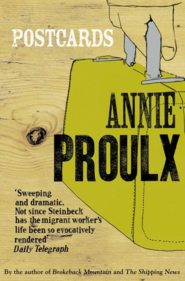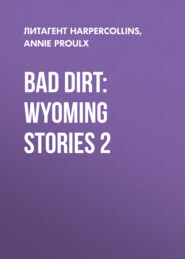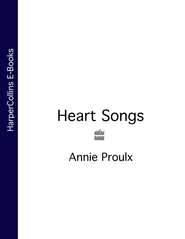По всем вопросам обращайтесь на: info@litportal.ru
(©) 2003-2024.
✖
That Old Ace in the Hole
Автор
Год написания книги
2018
Настройки чтения
Размер шрифта
Высота строк
Поля
“Sure.”
But he wasn’t that glad. The encounters in her gritty sheets, awash in her strong body odors, left him restless and disappointed. He wanted a few things to be different. But Marisa did have a hearty laugh and a certain sense of humor, though based on pain and accident. He had only once brought her to the apartment. She made it clear that she thought the apartment a cramped hole and Uncle Tam something of an idiot, nice but quite dumb.
“He’s vague, you know? Not with it, is he?”
It was neither sorrow nor relief that he felt when she told him they had to break up.
“I’m not going with you anymore,” she said. “There’s another guy.”
Soon enough he learned the other guy was Kevin Alk, a nearsighted math freak with an acned face and greasy hair that held the tracks of his comb.
“Good luck,” he said politely, but privately his thought was that Marisa and Kevin Alk deserved each other. As for himself, Marisa’s interest in him and then her lack of interest pointed up how unimportant he was to her. Only Uncle Tam counted some value in him, but what that value was Bob didn’t know. Nothing more than kinship he supposed and maybe a sense of obligation to his lost sister.
The apartment had a particular smell, an effluvium that came up from the shop below – dust-choked carving, musty upholstery, the bitter out-gas of celluloid and Bakelite, the maritime odor of ancient fish glue. The stairway up from the shop was narrow and crooked, the walls papered with some odd 1940s pattern of yellow trellis hung with red teapots. Upstairs, at the midpoint of the hall’s length, hung engravings and pictures that had come in with loads of junk and taken Uncle Tarn’s fancy. One showed fifty great rivers of the earth arranged as dangling strings and graded as to length, and the opposing corner illustrated a crush of mountain peaks, lined up from the smallest to the greatest, giving the impression of a fabulous and terrific range that existed nowhere in reality. Yet for years Bob believed that in some distant land hundreds of inverted ice-cream cone mountains gave way to an immeasurable plain cut by fifty rivers running parallel to each other.
“It’s not a real place,” said Bromo Redpoll. “You dunce. It’s only for the sake of comparison.”
The shop dealt in a wide variety of American junk but its specialty was plastic, and their mutual interest in resin and polymer objects joined the two men as twinned cherries on the stem. Uncle Tam could talk plastic manufacturing for hours, and had signed up for a course in chemistry the better to understand the complex processes.
There was a room in the shop – the best room – where nothing was for sale to the ordinary customer. A sign on the door said
ART PLASTIC
By Appointment Only
“One day,” Uncle Tam said, “probably not in our lifetime, but maybe in yours, Bob, people will collect plastic objects from the twentieth century as art, like now they are going after wooden grain cradles and windmill weights. This will be worth a fortune,” he said, waving grandly at the shelves and cases of Lucite bracelets, acrylic vases, Bakelite radios, polyethylene water pitchers. On floor pedestals, as if sculptures, stood plastic washing-machine agitators, black and white. The partners’ scavenging hunts ranged from outlying yard sales to periodic rakes through the shops of Antique Row on Broadway where they foraged for baby rattles, ancient billiard balls, even celluloid bibs from nuns’ old-style habits.
Within specialties there are often subsets of rarer specialties, and so it was with Bromo Redpoll and Tam Bapp. Bromo had collected a dozen phenol parasol handles with fancy metal bands. Tam sought out the British urea resin from the 1920s known as Beetleware – the forerunner of melamine. Silicone, polyurethane, epoxy were what they wanted but never would they buy anything for more than a few dollars. A side specialty was Bakelite jewelry from the 1920s. When Uncle Tam discovered, in the bottom of an old box of magazines, a Bakelite catalog from early in the century, both considered it a great find.
There were dozens of dolls and toys in the Art Plastic room but Bob preferred the Cleopatra Manicure Box to any of them, a striking red-and-black Art Deco box packed inside with plastic-handled files and emery boards and a few bottles of nail varnish dried to black powder. He pretended Cleopatra had actually owned it and the vials of dark dust were poisons.
The highlight of the week came on Sunday evenings when the Antiques Roadshow aired. Uncle Tam locked the shop at 4:30, even when customers stood beseechingly at the door as he hung up the Closed sign. The partners’ devotion to the program was extreme and they had evolved certain rituals. The coffee table was cleared of magazines and bills that had accumulated during the week. Their notebooks and pens were set out. The drinks, according to season and affordable ingredients, were to be made in the jazz-age silver penguin shaker – drinks containing coconut milk were esteemed, but coconut milk was expensive and it usually came down to a six-pack of Bud split between them. The food was peanut butter sandwiches, or carrot sticks and cheap cheese, or, if they were flush, buffalo wings or cardboard containers of tripe stew from Chickee’s place.
Plastics rarely made it onto the Antiques Roadshow but when they did both men were beside themselves and scribbled in their notebooks. When a podgy Baltimore man displayed his pristine, bright red ABS Olivetti typewriter and red slip-on case from the 1960s they stamped their feet in jealousy and shouted angrily when the “expert” put a paltry value of a hundred dollars on it. Uncle Tam said that if he had the money, he would fly to Baltimore and make the man an offer, though the airfare, of course, would bump the cost into the stratosphere. In the end he resigned himself to a fruitless Denver search for a match of the beautiful instrument.
The Antiques Roadshow could have gone on for hours; they would have remained leaning forward in happy anticipation, assigning values before the experts could speak, eating the carrot sticks which curved as they dried. At the end of the program they were both restless and Bromo went into the Art Plastic room to dust and wipe. They talked about making the big discovery that would put them over the top, and, very often, filled with enthusiasm, they headed out for the evening flea markets, coming home at midnight with boxes of worthless oddities. The closest they came to the big time was a yellowed journal kept by one A. Jackson which Tam thought might be Andrew Jackson. But in the pages the loving references (which gradually cooled) to “Mr. Jackson” dulled their expectations as they puzzled out that “A.” was Amelia Jackson of Poultney, Vermont, one in the grand parade of emigrants from New England to the gold fields of California in 1850. The diary – simple observations of weather and dust and miles traversed – ended abruptly at the Independence Rock stopover. Amelia Jackson wrote:
Mr. Jackson has concluded to break from this wagon train in company with several other men who cannot agree with our guide, Mr. Murk. I am to stay with the wagon and we will meet in San Francisco if Our Savior wills it. The men will undertake a short cut to the gold fields. I cannot think this the best plan. I would give a very great deal to be at home with mother and father and my dear sisters, in peace and harmony and with PLENTY of water in the cistern.
They managed to sell the journal for a few hundred dollars to the Pioneer Historical Library in Independence, Missouri, and Bromo said sourly that if it had been an Andrew Jackson journal they could have retired.
As the years went on Bob noticed that Bromo Redpoll was less keen on the antiques program than his uncle. He was increasingly derisive about Tiffany lamp shades and old journals. He would get up halfway through the hour, say “Call me if the Kenos come on” and go into the kitchen to poke through the refrigerator, for the only part of the show-that seemed to interest him now was the appearance of the Keno twins from New York, experts on American furniture. Bob thought the Kenos looked like animated waxworks but their clothes were fascinating. The word “natty” came to him. They were natty dressers as no one in Denver was nor could be.
Finally, the year Bob graduated from high school, the partnership ended on a Sunday night following the program. Bromo had spent most of the hour in the kitchen making Peanut Butter Dreams, but with one ear turned toward the living room in case Tam called “Keno alert!” At the very end it had come and he rushed in to see an exquisite highboy that had set the television twins’ hands trembling. Bromo watched, utterly rapt, the wooden spoon with its gob of batter in his hand. As the carousel music surged up and the credits rolled he sat on the sofa beside Tam and said, “We’ve got to talk.” He put the spoon on the coffee table, heedless of the batter sliding onto the table. Then he looked up and saw Bob watching them both.
“Here, Bob, will you finish making the cookies? I’ve got to talk to Tam.”
Bob, shooting a glance at his uncle who nodded, went into the kitchen, ostentatiously closing the swing door. He could hear Bromo’s voice growling on and on in some kind of low-key manifesto. He was curious but could not make out what they were saying, even when he stood with his ear on the door. Once in a while Uncle Tam would ask a question and off Bromo would go again, long, rolling breakers of speech, saying more than Bob had heard him say in eight years. When the cookies were done he put some on a plate and brought them in but the moment he pushed the door open they both shut up, watched him put the plate down, said thank you and waited until he left before starting to talk again. He took a handful of warm cookies for himself and went up to his room. At ten, yawning, he brushed his teeth for bed and heard them still at it downstairs, still talking.
At some time in the early morning he half woke, got out of bed and opened his door. The murmur of voices continued from downstairs. Now it was Uncle Tam talking, and the only words he could make out were “… fair market value.” They must be talking plastics, he thought.
Eight o’clock Bob galloped down the stairs, the first one down, and no wonder if they’d stayed up half the night talking about combs and bracelets. There was an empty scotch bottle in the trash. He started the coffee and went outside, ran down to the Continuum newsstand for the papers and, on the way back, stopped at the Sweet Mountain Bakery for the strawberry-pistachio Danish they all liked. Back in the kitchen he set the table, put out the milk and sugar, took three eggs from the refrigerator, looked for the nitrate-free bacon Uncle Tam insisted on buying, heard shuffling steps behind him. It was Uncle Tam in his ratty checkered bathrobe, looking bleary and hungover.
“Oh boy, I need some of that coffee.”
“How late did you guys stay up?”
“Until it got light. I just went to bed two hours ago.” He looked at the table, at the three places set. He picked up one of the plates, the silverware, put them away.
“Hey, what’d you do that for? Bromo likes breakfast too.”
“Not this morning. He’s gone. Left at five A.M. He persuaded me to buy his share of the business out. From now on it’s you and me, kid.”
“But where’d he go? Why? How could you buy him out if we don’t have any money?”
“He went to Iowa City where his sister lives, and from there he is going to New York. He says he wants to learn period furniture like the Keno brothers. He doesn’t care about Art Plastic anymore. And you’re right, I don’t have any money, so I had to promise to pay him a certain amount in case I can ever unload this dump. And now, if you don’t mind, let’s drop the subject permanently. I’ve just about got brain fever from it all.”
Bob had the sense to be quiet. And after a few weeks he got his first job – grocery packer at Sandman’s. In addition to his wage check he got meat and vegetables, eggs and fruit past their prime. So they lived on almost-spoiled produce and high meat, with frequent bouts of diarrhea.
3 ON THE ROAD AGAIN (#ulink_a1374270-5044-5b6b-8bfd-10f01c9eead7)
The morning after the celebratory steak dinner Bob was heading south down I-25 in a Global Pork Rind company car, a blue, late-model Saturn, watching out for escaped prisoners in white vans. He stopped for gas in Trinidad, got a dripping chile dog to eat while he drove, pulled over at a roadside spring below Raton Pass to clean his hands and wipe off the steering wheel.
On the passenger seat were the packages his uncle had handed him outside the restaurant.
He took twisting, climbing roads through northeast New Mexico, high dry ranchland empty of everything but cinder cones and cows and an occasional distant building surrounded by corrals. An elderly horseman herded forty cows down the middle of the road, not deigning to hurry them or turn them out of the right-of-way.
He climbed a switchback road lined with tough-looking shinnery oak. He guessed he was about an hour’s drive from the Picket Wire canyonlands along the Purgatoire River, south of La Junta. When he was thirteen, he, Uncle Tam and Bromo Redpoll had rented a car and driven down to the Withers Canyon Gate, planning to hike in to the fabled dinosaur track bed.
It was a hot day, over a hundred degrees by late morning. Bob and Uncle Tam each had a canteen of water. Bromo carried a daypack of cold beers, Bob and Uncle Tam clutched plastic bottles of water. Bromo and Bob wore hiking boots, Uncle Tam his old black and stinking sneakers. The road in to the gate where the trail began was a gauntlet of washouts and boulders. At the gate a posted sign said the round-trip hike was 10.6 miles.
“Damn,” said Uncle Tam, “that’s almost an eleven-mile hike.”
“Two hours in, two hours out,” said Bromo, draining the first of his beers and tossing the can behind a rock. “Leave it alone,” he said when Bob ran to pick it up. “We’ll get it on the way out. You’re too damn picky. Don’t be such an old lady.”
They set off slowly, climbing the rocky trail. The sun beat against Bob’s face and within twenty minutes he knew he was burning. He’d forgotten his cap. He said, “Uncle Tam, did you bring any sunblock?” He thought they were in a terrible place, bristling with cholla, yucca and purple prickly pear. Scraggy junipers clung to frying rock. The canyon walls rose around them, shooting out heat as from ray guns.
“Shit. No. Would have been a good idea. You got any, Bromo?”
“Back in the car. Want to run back and get it, Bob? We’ll wait for you.”
“No.” The idea of running anywhere was repulsive.
They walked on, Bromo in the lead as if he were heading up a safari. Every step raised a puff of yellow dust from the trail and their boots and Uncle Tam’s sneakers, their stocking tops and lower legs were soon coated with the stuff setting off an itchy sensation like hay chaff At first Bob tried to make the water in his twelve-ounce bottle last but he was parched and his throat clicked painfully when he swallowed. It felt as though his throat were bleeding inside. Bromo finished his fourth beer, carefully standing the can beside the trail.
“Get it when we come out,” he said as he had every time he finished one. He straightened up and a thin, arid rustle shivered the heat. Bob thought it was a cicada or a grasshopper and walked up, intending to pass Bromo, but Uncle Tam thrust out his arm with hard suddenness, hitting Bob in the face.
“Ow. What’d you do that for?”











